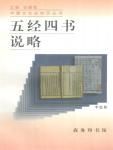Chapter 1 Section 1 "Five Classics" and "Four Books" Problem Solving
my country is one of the four ancient civilizations in the world, with five thousand years of cultural traditions and a vast collection of cultural classics.These classics are the precious heritage left to us by our ancestors, and the "Five Classics" and "Four Books" are the oldest parts of them.
"Five Classics" refers to the five classics "Yi", "Shi", "Li", and "Spring and Autumn"; "Four Books" refers to the four works of "University", "The Doctrine of the Mean", and "Mencius".These ancient books were respected as classics in the feudal society of our country, so they all belonged to the list of scriptures.
The classics included in the "Five Classics" existed before the Qin Dynasty, but they were not called "Classics" at the beginning.Calling them "Book of Books", "Book of Rites" and "Book of Spring and Autumn" began in the Han Dynasty.It is a book about divination.Because it was passed down from the Western Zhou Dynasty, it is also called "Book of Changes". "Book of Books" is a compilation of ancient historical materials, also known as "Shangshu". "Shang" means "previous generation". "Shangshu" means "the document of the previous generation", which means "historical document".It is an ancient poetry collection.Because this version was handed down by a scholar named Mao in the Han Dynasty, it is also called "Mao Shi".This scholar surnamed Mao, one said that he was Mao Heng who entered the Han Dynasty from the Qin Dynasty, and the other said that he was Mao Chang [Chang Chang] in the early Han Dynasty, but it is still unclear. "Book of Rites" refers to "Rituals" in the "Five Classics" of the Han Dynasty.In addition, there are two books on "rituals": "Zhou Li" and "Book of Rites".At the end of the Eastern Han Dynasty, the scholar Zheng Xuan annotated these three books of rites, collectively known as the "Three Rites", and they all obtained the status of "classics".Since then, the term "Book of Rites" has become uncommon.When the Tang Dynasty called it "Five Classics", "Li" refers to "Book of Rites"; when it called "Nine Classics", it included "Three Rites".That is to say, although the "Three Rites" were officially included in the scriptures after the Tang Dynasty, they were not called the "Book of Rites", but only their real names, or they were collectively called "Three Rites".This is just a matter of habit, there is no profound reason. "Spring and Autumn Classics" is the history book of Lu State, but this name is not commonly used, and there are few separate volumes.In most cases, "Spring and Autumn" is always compiled together with its annotations "Zuo Zhuan", "Gongyang Zhuan" and "Gu Liang Zhuan" respectively (only the Southern Song Dynasty supervised version "Chun Qiu" is single-cut).Their full names are "Chunqiu Zuoshi Zhuan", "Chunqiu Gongyang Zhuan" and "Chunqiu Guliang Biography", collectively known as "Three Biography". "Zuo (shi)", "Gongyang", and "Guliang" are the surnames of the author, all of whom lived before the Qin Dynasty.After the Eastern Han Dynasty, "Zuo Zhuan" was the most widely circulated and had the greatest influence. Therefore, after the Tang Dynasty, "Spring and Autumn" usually includes "Zuo Zhuan" at the same time, and even mainly refers to "Zuo Zhuan".
The works in the "Four Books" also existed in the pre-Qin period, but there was no such thing as the "Four Books" at that time.Among them is the Record of Confucius' Words and Deeds compiled after his death. "Mencius" is a book that records the political thoughts of Meng Ke, a Confucian master in the Warring States Period. "The Great Learning" and "The Doctrine of the Mean" were originally two articles in the "Book of Rites", which talked about learning and self-cultivation.Zhu Xi, a scholar in the Southern Song Dynasty, annotated them independently, and compiled them into a small series of books with "Mencius" and "Mencius" as a primary textbook for learning Confucian classics. Book".In addition, there is another name called "Xueyong Lun Meng".
The contents of the "Five Classics" and "Four Books" involve literature, history, philosophy, politics, economy, education, ethics, morality, astronomy, geography, art, science and technology, etc. They occupy a very important position in the development of Chinese culture. It is also a valuable material for the study of Chinese cultural history.

